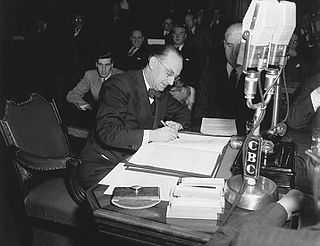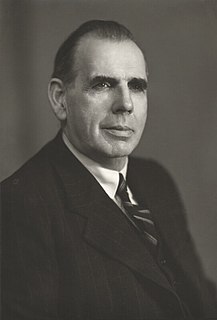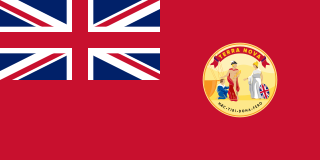
Newfoundland and Labrador is the easternmost province of Canada. Situated in the country's Atlantic region, it is composed of the island of Newfoundland and the continental region of Labrador to the northwest, with a combined area of 405,212 square kilometres (156,500 sq mi). In 2018, the province's population was estimated at 525,073. About 92% of the province's population lives on the island of Newfoundland, of whom more than half live on the Avalon Peninsula.
National referendums are seldom used in Canada. The first two referendums saw voters in Quebec and the remainder of Canada take dramatically-opposing stands, and the third saw most of the voters take a stand dramatically opposed to that of the politicians in power.

Joseph Roberts "Joey" Smallwood was a Newfoundlander and Canadian politician. He was the main force who brought the Dominion of Newfoundland into the Canadian Confederation in 1949, becoming the first premier of Newfoundland, serving until 1972. As premier, he vigorously promoted economic development, championed the welfare state, and emphasized modernization of education and transportation. Smallwood was a socialist in philosophy, noting in a 1974 documentary that he considered the People's Republic of China to be the ideal social state; he would nonetheless collaborate with bankers, turning against the multiple unions that sponsored numerous strikes. The results of his efforts to promote industrialization were mixed, with the most favourable results in hydroelectricity, iron mining and paper mills.

Gordon Macdonald, 1st Baron Macdonald of Gwaenysgor was a British Labour Party politician and Newfoundland's final British governor as well as the last chairman of the Commission of Government serving from 1946 until the colony joined Confederation in 1949 and became a province of Canada.
The Conservative Party of Newfoundland was a political party in the Dominion of Newfoundland prior to confederation with Canada in 1949.

The Dominion of Newfoundland was a country in eastern North America, today the modern Canadian province of Newfoundland and Labrador. It was established on 26 September 1907, and confirmed by the Balfour Declaration of 1926 and the Statute of Westminster of 1931. It included the island of Newfoundland and Labrador, on the continental mainland. Newfoundland was one of the original "dominions" within the meaning of the Balfour Declaration and accordingly enjoyed a constitutional status equivalent to the other dominions of the time.
Major Peter John Cashin was a businessman, soldier and politician in Newfoundland.

The Newfoundland National Convention of 1946 to 1948 was a forum established to decide the constitutional future of Newfoundland.
Newfoundland, as a British colony and dominion, held 29 general elections for its 28 Newfoundland House of Assemblies. In 1934 the Dominion of Newfoundland surrendered its constitution to the Crown and ceased to have a legislature in order to be ruled by London through the Commission of Government.

Pleaman Wellington Crummey JP (1891–1960) was a public figure in the Dominion of Newfoundland and the Province of Newfoundland. He was born at Western Bay, Conception Bay.
The Confederate Association was a political party formed and led by Joey Smallwood and Gordon Bradley to advocate that the Dominion of Newfoundland join the Canadian Confederation. The party was formed on February 21, 1948 prior to the launch of the 1948 Newfoundland referendums on Confederation. The party was opposed by the Responsible Government League led by Peter Cashin and the Party for Economic Union with the United States led by Chesley A. Crosbie.
Chesley Arthur "Ches" Crosbie was a Newfoundland businessman and politician.

The Economic Union Party was a political party formed in the Dominion of Newfoundland on 20 March 1948, during the first referendum campaign on the future of the country. The British-appointed Commission of Government had administered the country since the financial collapse of 1934. The alternatives were "responsible government", or "Confederation".

Prosperity returned to Canada during the Second World War. With continued Liberal governments, national policies increasingly turned to social welfare, including universal health care, old-age pensions, and veterans' pensions.

The Newfoundland Referendums of 1948 were a series of two referendums to decide the political future of the Dominion of Newfoundland. Before the referendums, Newfoundland was in debt and went through several delegations to determine whether the country would join Canada, remain under British rule or regain independence. The voting for the referendums occurred on June 3 and July 22, 1948. The eventual result was for Newfoundland to enter into Confederation.

The history of Newfoundland and Labrador covers the period of time from the arrival of the Archaic peoples, Prior to European colonization, the lands encompassing present-day Newfoundland and Labrador were inhabited for millennia by different groups of indigenous peoples.

The Canadian province of Newfoundland and Labrador is governed by a unicameral legislature, the House of Assembly, which operates under the Westminster model of government. The executive function of government is formed by the Lieutenant Governor, the premier and his or her cabinet. The politics of Newfoundland and Labrador is defined by a long history, liberal democratic political institutions and a unique political culture.
A dominion was one of the initially semi-independent countries, and later fully independent countries, under the British Crown that constituted the British Empire. "Dominion status" was a constitutional term of art used to signify a Commonwealth realm; they included Canada, Australia, New Zealand, Newfoundland, South Africa, and the Irish Free State. India, Pakistan, Ceylon, Nigeria, Kenya, and other former colonies were also dominions for short periods of time. The Balfour Declaration of 1926 recognised the Dominions as "autonomous communities within the British Empire", and the 1931 Statute of Westminster confirmed their full legislative independence.

Newfoundland Colony was an English and later British colony established in 1610 on the island of the same name off the Atlantic coast of Canada, in what is now the Canadian province of Newfoundland and Labrador. That followed decades of sporadic English settlement on the island, which was at first seasonal, rather than permanent. It was made a Crown colony in 1854 and a Dominion in 1907. Its economy collapsed during the Great Depression, and Newfoundland relinquished its dominion status, becoming once again a Crown colony governed by appointees from the Colonial Office in Whitehall in London. American forces occupied much of the colony in World War II, and prosperity returned. In 1949, the colony voted to join Canada as the Province of Newfoundland, but in 2001, its name was officially changed to Newfoundland and Labrador.










